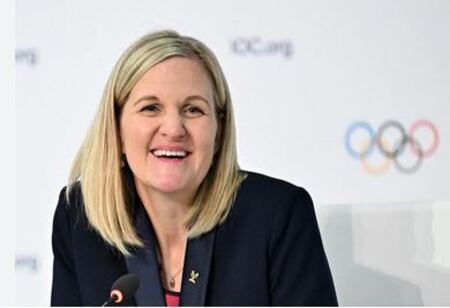
Kirsty Coventry's Vision for the Future of IOC


Within a matter of minutes Kirsty Coventry rose to the top of global athletics in just one brief round of voting in the presidential election for the International Olympic Committee (IOC). With this victory, she is now the most influential individual in sports, but even with her status as one of the leading candidates in the election, her rise stirs a sort of turmoil and positive change in the Olympic context.
Kirsty’s rise to becoming the youngest ever IOC president and the first from an African country, represents IOC’s drive to diversify its leadership and image. As a participant in five Olympic Games, she has represented her country at Sydney 2000, Athens 2004, Beijing 2008, London 2012, and Rio 2016. Throughout her career, she grew her expertise beyond the horizons of achievement in the pool. Her notable accomplishments include obtaining seven Olympic medals—two gold, four silver, and one bronze—as well as breaking several world records that have transformed the sport. Along with these honors, her rise from a competitive swimmer to a prominent sports administrator and minister captures her strife to leveraging sports as a tool for empowerment and social advancement.
Kirsty’s Plan to Turn a New Leaf in Olympics
At the core of Kirsty’s vision lie five essential priorities aimed at enhancing the Olympic Movement. These priorities could function as both objectives and a guide for tackling the intricate issues of the 21st century.
Kirsty perceives sport as a universal medium that brings together various communities and drives positive change. Her objective is likely to amplify the role of sports as a driving force for health, education, and social equity, championing grassroots programs that promote unity and resilience.
Recognizing that advancement necessitates open dialogue, she aspires to reinforce the relationship between athletes, national Olympic committees, and the broader Olympic community.
By promoting transparency and inviting participation, Kirsty hopes that every stakeholder will feel appreciated and heard.
In an increasingly interconnected world, no country or organization can function independently. Kirsty is committed to forging new alliances and enhancing current partnerships with sponsors, media, and governments to ensure the Olympic Movement continues to thrive economically and culturally.
In light of immediate global issues, she envisions an Olympic future that emphasizes sustainability. Her plan includes incorporating environmentally friendly practices into the preparation and execution of all Olympic events to create a positive legacy for subsequent generations.
During a period marked by distrust towards institutions, Kirsty aims to strengthen the principles of transparency, accountability, and integrity within the organization, ensuring that the Olympic brand is synonymous with excellence and fairness.
In her candidacy document, Kirsty discusses how her Olympic experience has influenced her identity and ignited a lifelong dedication to overcoming obstacles. She remembers that the Games not only honored athletic success but also promoted a greater understanding of humanity.
This reflection serves not merely as a personal story; it is also a rallying cry. Kirsty sees the Olympic Movement as a means for healing and progress in a world that is increasingly divided. Her pledge to serve, listen, and take action is focused on ensuring that the Olympic flame continues to shine brightly, inspiring hope and creativity.
Her Ascent is Not Without Challenges
Kirsty's election happens to come around a crucial time in sports. The IOC is grappling not only with logistical hurdles in organizing premier sporting events but also with the broader challenge of maintaining relevance in a time of swift technological advancements and geopolitical instability. Her leadership will be deployed on multiple fronts, including environmental responsibility, the ethical considerations of emerging technologies, and the delicate balance necessary to host international events during tense political climates.
A New Movement for Gender Equality
There is a movement towards achieving gender equality in Olympic sports. Kirsty’s rich experience as an athlete representative, combined with her ongoing role in the Athletes’ Commission, gives her a profound insight into the issues athletes face. These issues encompass gender eligibility, the potential threat to the Games' integrity due to doping, climate change, and the need for athlete advocacy.
At just 41 years old, she is well positioned to relate to athletes, who are often significantly younger than the officials in charge. This distinctive viewpoint might perhaps give her the advantage to interact with athletes in ways that earlier IOC leaders could not. Her predecessors were typically in or over their 60s by the time they were elected. This means that she is likely to resonate with younger generations more efficiently than those who came before her, especially through the use of modern technology.
She Brings a Global Perspective in Her Leadership Style
Given her experiences living in the global south, where she has been an activist for disadvantaged youth, Kirsty is well-equipped to direct the Olympic movement’s emphasis on utilizing sport for social change.
Her political journey, undertaken in Zimbabwe’s tough economic environment, indicates a promise for leveraging sport as a means to drive positive social change.
Nevertheless, while she might advocate for athletes' rights on various matters, her declared promise to remain neutral, especially concerning the Games, suggests a possible hesitation to tackle politically sensitive topics. The IOC’s traditional approach, maintaining the apolitical nature of the Games, is likely to continue to restrict the efficacy of athlete activism.
Her Road Ahead
As Kirsty prepares to take office on June 24, 2025, her groundbreaking election signifies the changing essence of the Olympics. It heralds the start of a new era characterized by diversity, unity, and the impactful nature of sports.
Also Read: Mary Barra: Icon Who Carved Woman Leadership Path in the Auto Industry
Instead of prioritizing financial rewards for medal winners, she aims to boost funding for the training and development of young athletes. This is where Podium Pursuit and ProTouch Africa come into play, providing the necessary financial and structural assistance for Africa’s future Olympians to reach the Games and not just secure medals.

